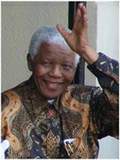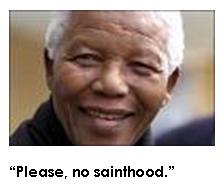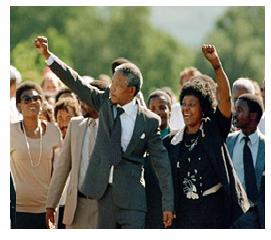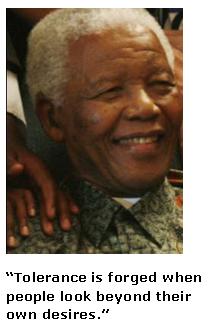
In this remarkable interview with John Battersby, Nelson Mandela – who turns 90 this month - reflects on his legacy and the lasting influence of his 27 years in prison.
Ten years after Nelson Mandela walked out of prison on Robben Island, and seven months after stepping down as president of South Africa, he reflects, in an interview with the Monitor, on his legacy and the lasting influence his 27 years in prison had on him.
Whatever my wishes might be, I cannot bind future generations to remember me in the particular way I would like," Nelson Mandela says.
Despite peace missions, a blistering schedule of overseas travel and stepped-up philanthropic activities, Mr. Mandela has begun to reflect on how he wants to be remembered both in an interview and at functions to pay tribute to him.
And despite his reluctance to be singled out and discuss his personal qualities, there is consensus in South Africa that without Mandela's personal commitment to reconciliation, his moral authority, integrity, and intense compassion, the country's transition to democracy might not have gone as smoothly.
Mandela is at pains to ensure that he is remembered as an ordinary mortal with qualities that are within the reach of ordinary people. "What always worried me in prison was [that I could acquire] the image of someone who is always 100 percent correct and can never do any wrong," he told one audience of 500. "People expect me to perform far beyond my ability."
"What always worried me in prison was …… the image of someone who is always 100 percent correct and can never do any wrong."
He expanded on these reflections for the first time in a recent interview with the Monitor, which probed his philosophy of reconciliation, the origins of his moral integrity, and the experiences and influences that forged the qualities which have made him one of the heroes of the 20th century.
He also spoke about the importance of religion in his life and the crucial role of reflection and "the time to think" during his 27 years in jail.
History will remember Mandela for having the strength of conviction to risk engaging his jailers - and thereby humanizing them - from inside prison and eventually setting the stage for the ANC to negotiate them out of power. Mandela sees the success of the ANC in mobilizing both domestic and international opinion against the apartheid government as the key factor.
In the interview, Mandela insisted that he wanted to be remembered as part of a collective and not in isolation. On his release from jail 10 years ago tomorrow, he made it clear that he regarded himself as a "loyal and obedient servant" of the African National Congress (ANC), the liberation movement he headed before becoming South Africa's first democratically elected president in May 1994.
"I would like to be remembered as part of a team, and I would like my contribution to be assessed as somebody who carried out decisions taken by that collective," Mandela says, adding that even if he wanted to be remembered in a specific way that was not a realistic option.
Mandela was speaking in the living room of the house he shares with his second wife Graca Machel, whom he married in 1998. It is a doubly-story house in the plush Johannesburg neighbourhood of Houghton.
"As prisoners, we used our individual and collective positions to make friends with some of our jailers. But this must be understood against the bigger picture of what was happening outside - an organized and disciplined struggle by our organization and the international community," he says.
Please, no sainthood
At the launch, late last year, of a book to commemorate him, written by South African journalist Charlene Smith (due out in the US this April, New Holland/Stuik), Mandela insisted that he not be elevated to some kind of sainthood.
The paradoxical side of the man is that he has sometimes taken on superhuman tasks such as his shuttle last October to Iran, Syria, Jordan, Israel, Gaza, and the United States in a bid to broker a comprehensive Middle East peace.
Despite what Mandela described as "positive and cordial" meetings with Israeli Prime Minister Ehud Barak and President Ezer Weizman, Israel rejected his intervention. But Mandela was not unduly discouraged.
 "There are bound to be setbacks," he says.
"There are bound to be setbacks," he says.
Mandela was greatly encouraged by the eventual outcomes of his interventions in East Timor and the handing over by Libya of those accused of the bombing of the Pan Am flight over the Scottish town of Lockerbie in 1988. He spent seven years mediating the behind-the-scenes negotiations with Saudi Arabia.
He says it is important that leaders should be presented to people with their weaknesses and all. "If you come across as a saint, people can become very discouraged," he says. "I was once a young man and I did all the things young men do," Mandela says, to drive home the point of his human fallibility.
Biographers and commentators have been intrigued by Mandela's extraordinary focus and unity of purpose during his years as a young ANC activist and later as its spiritual leader from behind bars.
"If you have an objective in life, then you want to concentrate on that and not engage in infighting with your enemies," he says in the interview. "You want to create an atmosphere where you can move everybody towards the goal you have set for yourself - as well as the collective for which you work.
"And, therefore, for all people who have found themselves in the position of being in jail and trying to transform society, forgiveness is natural because you have no time to be retaliative.... You want to mobilize everybody to support your cause and the aims you have set for your life," he says.
"For all people who have found themselves in the position of being in jail and trying to transform society, forgiveness is natural because you have no time to be retaliative.... You want to mobilize everybody to support your cause and the aims you have set for your life."
Asked about the origins of his passionate belief in reconciliation and forgiveness, Mandela goes into a lengthy explanation of how he launched the Mandela Children's Fund after a personal encounter with homeless children in Cape Town who had come to see him to explain their plight. He was so moved that he vowed in that moment to launch the fund, which has collected more than $25 million and has helped hundreds of children. Mandela donated a third of his presidential salary to the fund during his five years in office. Many business executives matched his example and some bettered it.
What Price Reconciliation?
Mandela is sensitive to criticism from certain black leaders that he has leaned over too far toward whites in his efforts to achieve reconciliation and forgiveness. He becomes emotional when defending his impressive campaign over the past few years to get business leaders to donate funds for the building of schools and clinics in the rural areas.
"Why would anyone say that I am leaning too much towards whites? Tell me the record of any black man in this country who has done as much as that [for black people].... I am not aware of any other black man who has spent so much time addressing the problems of poverty, lack of education, and disease amongst our people," Mandela says, adding that he had nothing but cooperation and support from the white business community.
When it comes to his moral authority and achievement in persuading his jailers and their political bosses to negotiate with him, Mandela again stresses the moral high ground of the ANC cause.
"When you have attained the moral high ground, it is better to confront your people directly and say: Let's sit down and talk. So, it is not something that just comes from me. It is something that was worked out by the organization to which I belong."
Mandela speaks of the influence that veteran ANC leader Walter Sisulu had had on him while in prison and how he was instrumental in taking care of fellow prisoners regardless of their political background.
Mandela has in turn been praised by Eddie Daniels, a former Robben Island prisoner from a rival anti-apartheid organization, who has told how Mandela befriended him and kept his cell clean when he was ill.
Transformation in Prison
Mandela says, "I can tell you that a man like Sisulu was almost like a saint in things of that nature. "You would really admire him because he is continually thinking about other people.
"I learned a great deal from him - not only on that respect but also, politically, he was our mentor. He is a very good fellow ... and humble. He led from behind and put others in front, but he reversed the position in situations of danger. Then he chose to be in the front line."
In "Mandela: The Authorized Biography" (Knopf), Anthony Sampson notes the remarkable transformation in the Mandela that emerged from jail compared with the impulsive activist with a quick temper he knew in the late 1950s (reviewed Sept. 30, 1999).
Mandela does not dispute Mr. Sampson's judgment and acknowledges the importance of mastering his anger while in prison. "One was angry at what was happening [in apartheid South Africa] - the humiliation, the loss of our human dignity. We tended to react in accordance with anger and our emotion rather than sitting down and thinking about things properly.
"But in jail - especially for those who stayed in single cells - you had enough opportunity to sit down and think. And you were in contact with a lot of people who had a high education and who were widely traveled. When they told of their experiences, you felt humbled.
"All those influences changed one," Mandela says. Sampson quotes from a letter that Mandela wrote to his then wife, Winnie, in 1981 after she had been jailed.
"Thinking is one of the most important weapons in dealing with problems ...”
Mandela noted that there were qualities "in each one of us" that form the basis of our spiritual life and that we can change ourselves by observing our reactions to the unfolding of life.
He urged Winnie in the letter "to learn to know yourself ... to search realistically and regularly the processes of your own mind and feelings."
In the interview, Mandela says that one of the most powerful forces that changed him was thinking about how he had behaved and reacted to generosity and compassion expressed toward him in the past.
"For example, when I arrived in Johannesburg [as a young man], I was poor, and many people helped me get by. But when I became a lawyer and I was in a better position [financially], I became too busy with legal affairs and forgot about people who had helped me.
"Instead of going to them and saying: Look, here's a bunch of flowers or a box of chocolates and saying thank you, I had never even thought about these things. I felt that I had behaved like a wild man ... like an animal and I really criticized myself for the way I had behaved.
 "But I was able to do this because I had time to think about it, whereas outside jail - from morning to sunset - you are moving from one meeting to the other, and there is no time to think about problems. Thinking is one of the most important weapons in dealing with problems ... and we didn't have that outside."
"But I was able to do this because I had time to think about it, whereas outside jail - from morning to sunset - you are moving from one meeting to the other, and there is no time to think about problems. Thinking is one of the most important weapons in dealing with problems ... and we didn't have that outside."
Peter Ustinov, the veteran actor, author, and international citizen, met Mandela in South Africa two years ago and was struck by the importance Mandela attached to the long period of solitude in prison.
"I had a most inspiring meeting with Nelson Mandela," Ustinov told this reporter in an interview in the Swiss Alpine town of Davos. "He told me with a certain amount of irony and wickedness: 'I am grateful for the 27 years I spent in prison because it gave me the opportunity to meditate and think deeply.... But since I came out of prison, I haven't had the time.' "
Make Time for Reflection
How has Mandela made time to think since his release from jail in 1990? He says that he has tried to emulate the practice of businessmen who take a complete break from their work over weekends. Mandela says he consciously has tried to make time for reflection.
After his separation from Winnie, Mandela used to spend long periods in retreat in the home of a wealthy Afrikaner businessman, Douw Steyn, who ran an open house for the ANC to hold meetings during the negotiations with the government. It was here that Mandela proofread the script of his autobiography: "Long Walk to Freedom" (Little Brown).
In November last year, Mandela accepted an invitation to be the guest speaker at a gala evening to mark the transformation of the house into a super-luxury guest house, retreat, and conference centre.
In an impromptu speech, Mandela waxed philosophical and introspective in paying tribute to the warmth and hospitality of his Afrikaner hosts.
"It has been said that difficulties and disaster destroy some people and make others," Mandela began. It was a phrase he had last used in a letter to Winnie in 1975. "Douw Steyn is one of those who has turned disaster into success," he said of the wealthy businessman who had formerly supported apartheid.
Change Yourself First
"One of the most difficult things is not to change society - but to change yourself," he said. "I came to stay here at some of the most difficult moments, and the way Liz and Douw treated me has left me with fond memories."
Mandela said that Douw Steyn had changed and was now part of the white business community that was sharing its resources with the poor. That gave him a feeling of fulfilment. "It enables me to go to bed with an enriching feeling in my soul and the belief that I am changing myself [by reconciling with former adversaries]," Mandela said.
 Mandela has spoken on other occasions of the importance of giving. When he received a bag of some 20,000 postcards in September from children who were invited to wish him well for his retirement, he said that there was nothing more important in life than giving. Tolerance is forged when people look beyond their own desires, he said.
Mandela has spoken on other occasions of the importance of giving. When he received a bag of some 20,000 postcards in September from children who were invited to wish him well for his retirement, he said that there was nothing more important in life than giving. Tolerance is forged when people look beyond their own desires, he said.
Mandela said that religion had played a very important role in his life. He has tended to avoid talking about the subject in the past. In December, Mandela addressed a gathering of religious leaders from the world's major faiths in Cape Town. He spoke publicly about his views on religion for the first time.
"I appreciate the importance of religion. You have to have been in a South African jail under apartheid where you could see the cruelty of human beings to each other in its naked form. Again, religious institutions and their leaders gave us hope that one day we would return."
Mandela said that real leaders were those who thought about the poor 24 hours a day and who knew in their hearts that poverty was the single biggest threat to society.
"We have sufficient cause to be cynical about humanity. We have seen enough injustice, strife, division, suffering, and pain, and our capacity to be massively inhuman. But this gathering counters despairing cynicism and reaffirms the nobility of the human spirit," Mandela said.
Power of Religion
Mandela went on to say, "Religion is one of the most important forces in the world. Whether you are a Christian, a Muslim, a Buddhist, a Jew, or a Hindu, religion is a great force, and it can help one have command of one's own morality, one's own behaviour, and one's own attitude."
"Religion has had a tremendous influence on my own life. You must remember that during our time - right from Grade 1 up to university - our education was provided by religious institutions. I was in [Christian] missionary schools. The government [of the day] had no interest whatsoever in our education and, therefore, religion became a force which was responsible for our development," he said.
The discipline of jail also played a role in his transformation, he said.
"It was difficult, of course, to always be disciplined before one went to jail except to say that I have always liked sport. And to that extent I was disciplined in the sense that four days a week I went to the gym for at least two hours.
"Also, I was a lawyer, and I had to be disciplined to keep up with events in the legal field, and to that extent I was disciplined," he said.
{mosimage}But Mandela said there were many respects in which he and his colleagues were not disciplined when they went to jail.
"In prison, you had to follow a highly disciplined regime, and that, of course, influenced your behaviour and your thinking," he said.
Mandela said there was also a personal discipline. "We continued to do our own exercises, and we continued with study and conversing with others to gain from their experiences."
He said that reading the biographies of the great leaders of the century also had a major impact on him. Mandela said it was though reading the biographies that he realized that problems make some people and destroy others. Mandela said that the prison experience taught him to respect even the most ordinary people. "I have been surprised a great deal sometimes when I see somebody who looks less than ordinary, but when you talk to the person and he (or she) opens his mouth, he is something completely different.
"It is possible that if I had not gone to jail and been able to read and to listen to the stories of many people ... I might not have learned these things."
This article was first published in the Christian Science Monitor in 2000. John Battersby is a former editor of the Sunday Independent and a former southern Africa correspondent of the Christian Science Monitor.
 ReConnect Africa is a unique website and online magazine for the African professional in the Diaspora. Packed with
essential information about careers, business and jobs, ReConnect Africa keeps you connected to the best of Africa.
ReConnect Africa is a unique website and online magazine for the African professional in the Diaspora. Packed with
essential information about careers, business and jobs, ReConnect Africa keeps you connected to the best of Africa.